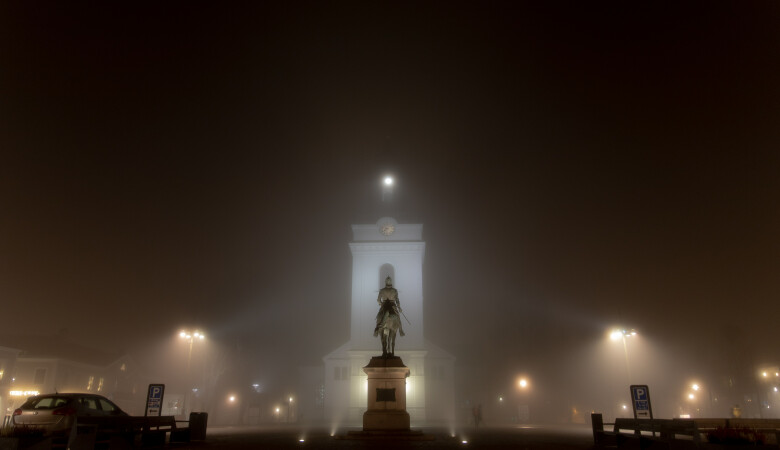The Reign of Sin and Death Through Adam (Romans Sermon 31 of 120)
June 17, 2001 | Andy Davis
Romans 5:12-14
Original Sin
A World Engulfed in Evil and Sin
Romans Chapter 5, we're continuing our study in Romans. And this morning, we're going to be focusing in on Chapter 5:12-14. Now obviously, you know that this past week, Timothy McVeigh was executed for his cold-hearted bombing of the office building in Oklahoma City and I think many of you were following that in the newspapers and concerned about that. The act was heinous enough, but just as stunning (at least to me personally) was McVeigh's coldness of heart is lack of remorse, lack of sadness in any way for the things that he'd done. 168 people were dead and 19 children and all he could do is call the victims of his crime collateral damage. There was just a deadness to his soul that just brought chills to me. And so deep were the issues of evil that McVeigh brought to our national attention that Newsweek ran a cover article that a church member gave to me to read, May 21st and the title of the article was Evil: What Makes People Go Wrong. So asking a question of origins of evil. What is it that makes somebody do something like this?
The article had some comments I thought that were very incisive. One of the articles, (there are three or four articles together), one of them had this to say about McVeigh: "We want to see Timothy McVeigh, somehow as evil incarnate, as Satan, as depravity in human form. He has willfully and gratuitously inflicted harm on others, the very definition of an evil act, through a cold cruel calculation untouched by compassion. There's a reason we need to view McVeigh this way, it allows us to place him in a category labeled evil with a capital E, but also more importantly labeled, ‘not us.’"
People want to say, "You see. That's him. There's just something about him that's intrinsically different from me. I would never do something like that." The idea that the enormity of McVeigh's act in the yawning hole in his soul where human compassion should lie, set him worlds apart from us. And then the article goes on to ask "or did it?" Did it? And the burden of the text today is to show that there is an intrinsic unity to the human race even in terms of sin and death that is so deep and so compelling as to necessitate a salvation that only Jesus could provide. One expert quoted in this article said the capacity for evil is a human universal. There is a continuum of evil of course ranging from trivial evils like cutting someone off in traffic, to greater evils like acts of prejudice to massive evils like those perpetrated by serial killers, but within us all there are the roots of evil.
So what is the origin of sin? What is the origin of evil within the human heart? The article said all religions turn to myths in order to account for the origins of evil. Now here Newsweek went amiss I believe. It said that all religions turn to myths in order to account for the origins of evil: Judaism, Christianity, and Islam all looked to the myth of Eden. Where evil enters the world through the disobedience of Adam and Eve, humanity's primal parents. The myth of Eden. Brothers and sisters, if Eden is a myth so is Jesus Christ. Because Paul links the two together. Adam and Christ in Romans Chapter 5. And Adam is a type or an example of Jesus Christ. And there's something that happened in Adam that finds its parallel in Christ. Linked with this whole discussion of the origin of evil is the origin and the universality of death. A fate that faces everyone from the greatest to the least, from the most wicked killer like Timothy McVeigh to the tiny little infant carried out of the wreckage… You remember that photo, the fireman carrying that little one.
And how can it be that all of us are subject to this death penalty. 18th century poet Thomas Gray wrote these haunting lines in a poem called Elegy in a country courtyard. "The boast of heraldry, the pomp of power. And all that beauty, all that wealth e'er gave, awaits alike the inevitable hour. The paths of glory lead but to the grave." How can it be that sin and death are universal? How is it that the banker in Tokyo and the chimney sweep in London and the humble rice farming peasant in Thailand and the pastor in Durham North Carolina are all subject to the same penalty namely death. How did sin and death come to have universal sway over the human race? Why is it that every single human culture, in every time in history has had to wrestle with the sin of its own people? To make laws to deal with this. And why is it that all people innocent and guilty alike are subject to death?
These things are addressed in the passage that we're facing today, Romans Chapter 5:12-21. Now we're going to focus on Verse 12-14, but in order to understand the larger context I'm going to read all the way to Verse 21. Look if you will and read along with me beginning at Verse 12.
"Therefore, just as sin entered the world through one man, and death through sin, and in this way death came to all men, because all sinned. For before the law was given, sin was in the world. But sin is not taken into account when there is no law. Nevertheless, death reigned from the time of Adam to the time of Moses, even over those who did not sin by breaking a command, as did Adam, who was a pattern of the one to come. But the gift is not like the trespass. For if the many died by the trespass of the one man, how much more did God's grace and the gift that came by the grace of the one man, Jesus Christ, overflow to the many! Again, the gift of God is not like the result of the one man's sin: The judgment followed one sin and brought condemnation, but the gift followed many trespasses and brought justification. For if, by the trespass of the one man, death reigned through that one man, how much more will those who receive God's abundant provision of grace and of the gift of righteousness reign in life through the one man, Jesus Christ. Consequently, just as the result of one trespass was condemnation for all men, so also the result of one act of righteousness was justification that brings life for all men. For just as through the disobedience of the one man the many were made sinners, so also through the obedience of the one man the many will be made righteous. The law was added so that the trespass might increase. But where sin increased, grace increased all the more, so that, just as sin reigned in death, so also grace might reign through righteousness to bring eternal life through Jesus Christ our Lord."
I. The Rake or the Shovel? (From John Piper)
Now, I have preached many sermons here, but I have never preached such a meaty passage as we're facing today. This is meat. It's very, very difficult to understand properly the connection between us and Adam, and the relationship between Adam and Christ. But Paul seems to think it's important. And therefore, I'm going to urge you to dig deep into the Scripture. John Piper said, "You know with the Scripture, you can either work with a rake or with the shovel. With the rake, you go across the surface, and you get leaves. With a shovel, you dig, and you might get gold."
So if you're going to go across Romans Chapter 5:12-21, with the rake, you're going to get very little. You have to think and follow what Paul is saying. Now, Paul has a major point and some minor points. The major point that Paul makes is a comparison between Adam and Jesus Christ. There is some kind of an analogy being drawn here between Adam and Christ. So we're supposed to see something in Adam, and then translate it over to what happened in Christ. Basically, there are three issues that Paul is dealing with here. Number one, the obedience of Christ is parallel to, but vastly superior to the disobedience of Adam. Secondly, the righteousness imputed or credited to the account of those who are in Christ is parallel to but vastly superior to the unrighteousness and condemnation credited to us in Adam. And thirdly, the life which comes to us who are in Christ through that imputed, that gift of righteousness is parallel, but vastly superior to the death that comes to those who are in Adam through credited sin. That's what Paul is saying here. If you're going to understand those three things, you get Romans 5:12-21.
II. Questions of Context
Let's try to understand this in context. Where are we? Big picture. We're in the Book of Romans. What is the purpose of the Book of Romans? To tell us what the gospel is. Brothers and sisters, there are many false gospels out there. I could give you false gospels, and they will resonate with you, and you will sound... It will sound familiar, pulling yourself up by your boot straps, trying to be the best person you can be, all those kind of thing. That is not Christian faith. The gospel is something entirely different. If you want to understand the gospel, you got to go to the Book of Romans, and understand it.
Paul says in Romans 1:16, "I am not ashamed of the gospel because it is the power of God for the salvation of everyone who believes." For in the gospel, a righteousness from God comes to all who believe. A righteousness that is from faith to faith. And then from Romans' middle of Chapter 1 up through middle of Chapter 3, he explains why all of us, every single one, Jew and Gentile, every single person who has ever lived needs that gift of righteousness or we will not survive Judgment Day. Everyone of us needs to be declared not guilty as a result of the blood of Jesus Christ. There is no other salvation. All have sinned and fall short of the glory of God. There is no one righteous. No, not one. There is no one who understands, no one who seeks God. All have turned away. They have together become worthless. There is no one who does good, not even one, Romans Chapter 3.
But then right in the middle of Chapter 3 comes the gospel. Substitutionary atonement. Jesus Christ stands in our place, and he takes the penalty of our sin. He dies in our place. And through faith in his blood, we can be acquitted. We can be declared not guilty before God on Judgment Day. That is the gospel.
And then in Chapter 4, we got the picture of Abraham standing out under the stars, and God makes a promise. Point up at the stars, so shall your offspring be. Abraham believes God. And at the moment he believes, he's declared not guilty. Simple faith. He didn't do anything righteous. This is a God who justifies wicked people, a God who justifies the ungodly simply by faith and a promise. The promise now is the promise of eternal life in Jesus Christ, not the promise that our offspring will be as numerous as the stars, but rather that we will live forever through faith in Jesus Christ. And all you need to do is simply believe that message, and you will be saved.
And then as we've seen over the last three or four sermons in Romans 5:1-11, there is that assurance of salvation. If you have been justified by faith, most certainly, you will finish the journey. You will complete the life of faith, and you will go to heaven. There is an assurance. And now as Paul finishes up his whole treatment on justification by faith alone apart from works of the law, we're going to look at Adam and Christ. And what a way to finish. Why does he bring us into the depths that he does, why into the deep waters? Because there's something he wants us to understand about justification.
The Parallels and Differences Between Adam and Christ
In Chapter 6, 7, and 8, we're going to be talking about sanctification, how you grow in holiness as a disciple of Jesus Christ. But we're going to finish with justification by considering Adam and Christ. So that's where we are in context. Now, if you look at Verse 14 of the section we're going to focus on today, it says Adam is a type or a pattern of him who is to come, Christ. Adam is a pattern of Christ. There's something in Adam that teaches us something about Christ. And then throughout the section that we read verse 12, it says, "Just as sin enter the world through one man." But who is that one man? It's Adam. Verse 15, "The many died by the trespass of the one man." Who is the one man? It's Adam. Verse 16, "The judgment followed one sin…" The sin of Adam and brought condemnation. Verse 17, "For if by the trespass of the one man, death reigned through that one man." We're focusing on this one man, Adam. And so also, we focus on Christ in verse 15, "God's grace, and the gift that came by the grace of the one man, Jesus Christ, overflow to the many." And then in Verse 17 it says, that we will "reign in life through the one man, Jesus Christ."
You see the parallel set up here between Adam and Christ. There is some kind of an analogy. And we're comparing the two so that we can learn about our salvation. In summary, in verse 18-19 it says, "Consequently, just as the result of one trespass was condemnation for all men, so also the result of one act of righteousness was justification that brings life for all men. For just as through the disobedience of the one man the many were made sinners, so also through the obedience of the one man the many will be made righteous." There's the full parallel that we get.
But there's also differences between Adam and Christ. And this Scripture also desires, not just to draw a parallel but to show that there's a difference between Adam and Christ, key difference. In verse 15 it says, "The gift is not like the trespass." Again, he says the same thing in the next verse, not like. So there's a similarity, but there's a difference between Adam and Christ. We're going to talk more about that next week. We must come to see just how superior Jesus Christ is. And, yes, sin and death are universal as a result of the solidarity, the oneness of the human race in God's mind that we all died in Adam but the salvation we get in Jesus Christ is so much greater than anything we were cursed with in Adam.
The final bottom line of Romans 5:12-21 is what a great savior we have in Jesus Christ and what a great salvation that God has provided for us simply by faith.
III. How Sin and Death Entered the World
Now the issue here of how sin and death entered the world as I said, is not the major issue. The major issue is that we might understand justification by faith. But how did sin and death enter the world? Look at verse 12, "Therefore, just as sin entered the world through one man, and death through sin, and in this way death came or spread to all men, because all sinned." Now you know the history of Adam and Eve, Garden of Eden. Brothers and sisters, this is not a myth. I don't care how much you read it in Newsweek, it just isn't true. I know that's hard to believe that not everything in Newsweek is true. But it's true that not everything is true in Newsweek.
Adam and Eve are not a myth. And you could see now how if Adam's a myth then we must say Christ is a myth because there's a definite connection being drawn here between Adam and Christ. Now you know what happened, God placed Adam in the garden, and he said, "You are free to eat from any tree in the garden; but you must not eat from the tree of the knowledge of good and evil. For when you eat of it, you shall surely die."
And so from the very beginning, God has married together sin and death. The wages of sin is what? Death. There's no question about it, there's a connection between sin and death right from the beginning. It was re-established in the minds of the Jews over and over, with every sacrifice, every animal sacrifice. The wages of sin is death, the wages of sin is death. We see it over and over. But right from the start, God united together sin and death by telling Adam, "If you eat from that tree, you will die." And so Adam was being tested. Eve joined him later in the accounts, and you know the story. The serpent tempted Eve and she was deceived and she ate, she gave the fruit to her husband and he ate. But sin entered through Adam, very significant. Eve isn't even mentioned in Romans Chapter 5, because Adam was our representative at the tree. He was our head. And it was through him that sin came to the whole human race.
Adam had a perfect purity in the world beforehand. There was a satanic rebellion in the spiritual realms. We know that before the fall in Eden, because it was… Satan attempted… And he had already fallen. So he was in rebellion from the beginning, he was a liar and a killer from the beginning. And he was basically, I believe on a recruiting mission at the garden of Eden. He was going to recruit the human race (Satan was), into his rebellion against God, and he was successful in that recruiting.
And we have been recruited, and we are born into Satan's kingdom, we are born into the kingdom of darkness and at some point we have to be rescued and transferred into the kingdom of light. But we are born into that kingdom of darkness and the recruiting happened at the very start. And it says in Romans 5:12, "Sin entered the world." It is so important that you understand it, it does not say sins entered the world. Sins are a result of sin. We all have many sins but we're not talking about sins here, we're talking about the principle, the power of sin. And that entered the world. It's like a king, sin reigned in death it says. There's a sovereign power almost of sin that cannot be broken except by Jesus Christ. And so that principle of sin entered the world through one man, and death through sin.
Now as we talk about death, what kind of death are we referring to? Scripture refers to three. There is a spiritual death, there is a physical death, and there is an eternal death. Spiritual death happened for Adam the moment he ate, he died spiritually. That means he died to God. He died in his relationship with God. This is referred to in Ephesians 2:1, "But as for you, you were dead in your transgressions and sins, in which you used to live." You were dead while you lived. Living dead. This is the spiritual death and all of us who are not born again, all of us who have not come to faith in Christ, we are spiritually dead. And that happened to Adam that day, the moment he ate.
Physical death happened next, for Adam much later. He died when he was over 900 years old, but it came later. And then eternal death, in hell. Matthew 10:28, Jesus said, "Do not be afraid of those who kill the body but cannot kill the soul. Rather, be afraid of the one who can destroy both soul and body in hell. Yes, I tell you, fear him." And so you see the three kinds of death that we're subject to as a result of sin. Spiritual death, a broken relationship with God. Physical death, which comes later and we're all of us under that death penalty. And then eternal death, in hell. The very thing that I believe the gospel of Jesus Christ came to save us from.
And it says that death spread to all. Now, brothers and sisters, I don't understand this. You've heard of the human genome project? Where they're sifting over all the genes. You think they're going to find a sin gene somewhere? I don't think so. I don't understand this. This is mystery to me, but death spread. Sin and death spread through the whole human race. It says, "In this way, death spread and sin spread." In what way? In the way of Adam's one transgression. In this way, it spread to everybody. This is underscored in the steady drone in Genesis Chapter 5, that genealogy chapter. "Altogether Adam lived 930 years and then he died." Genesis 5:8. "Altogether Seth lived 912 years, and then he died." Genesis 5:11. "Altogether Enosh lived 905 years, and then he died." 5:14, "Altogether Kenan lived 910 years and then he died." And it's been going on, hasn't it, ever since. It goes on around us all the time and every single one of us is subject to this death penalty. If the Lord does not return in our lifetime, everyone sitting in this room today will die someday.
Universal death penalty “In Adam”
And according to Romans 5, it's because we were united somehow with Adam. That's a teaching of this text. And this death penalty comes to all who are in Adam, but there's a new race, isn't there? A new race of human beings, those who are in Christ. And there's only two of those categories. Everyone is either in Adam or they're in Christ. 1 Corinthians 15:22, it says, "For as in Adam all die, so in Christ will all be made alive." Praise God for that. Praise God that there's a new Adam, a new head to the human race and by faith in him we can be transferred and miss the eternal punishment of death.
Now, at the end of Verse 12, look at it. It says, "Therefore just as sin entered the world through one man, and death through sin, and in this way death came to all men…" What does it say? "Because all sinned." You can circle those words. Those are the most important words to interpret properly in the entire section. If you interpret it wrong, you'll get... I believe Christianity wrong. What does it mean that we all sinned in Adam? There's two possibilities. Either we all sinned like Adam sinned or we all sinned somehow through some spiritual union with Adam. In other words that his sin became our sin, one or the other.
Now, the first case, we all sinned like Adam, meaning we heard a command from God, we understood the command from God and rebelled against the command of God. Well, that's true but I don't think that's what Paul's talking about here. And if you trace it out, you will understand the gospel wrongly. How is it? Okay, just as through one man sin entered the world and death through sin and this way death came to all men because all committed individual acts of unrighteousness. So also life entered the world through one man and righteousness through him and in this way, righteousness came to everybody who committed the similar acts of righteousness that Jesus commits. In other words, if you do the righteous things Jesus does, you'll get saved. Is that the gospel? That is salvation by works, folks. And it's a burden none of us will be able to bear. We cannot save ourselves by good works, by righteous deeds. So because all sinned, means something else.
It means we sinned through union with Adam and so also through union with Christ, we have a righteousness that doesn't belong to us either. You see how it works? That's the gospel. We get our righteousness as alien from us just as we got a condemnation that was alien to us as well. Now, I know that this is what Paul is saying because he interrupts his own thought. And maybe he didn't even notice it. Verse 12, "Therefore, just as sin entered the world through one man, and death through sin, and in this way death came to all men, because all sinned. For before the law was given, sin was in the world. But sin is not taken into account when there is no law. Nevertheless, death reigned from the time of Adam to the time of Moses."
IV. Death’s Reign Universal Because “All Sinned” (verses 13-14)
What did he do? Stop and think. Therefore, just as, dot, dot, dot... What are you waiting for? So, also, right? Just as, so also. Well, he finishes it in verses 18 and 19, but he's got all these verses in the middle to explain what he means. And why does he stop? Because he's afraid that you will not understand what it means when he said, "because all sinned." You're going to think it's because I lied, or because I didn't obey my mom and dad, or because I commit this or that sin. That is not what he's saying here. That's the fruit that comes out of the nature, but that's not what he's saying here.
So he interrupts himself and he talks about sin from Adam to Moses. What happened from Adam to Moses? Well, sin was in the world, but it's not taking into account when there is no Law. There was no law. Adam and Eve had a specific law in the garden, didn't they? "You must not eat from the tree of the knowledge of good and evil..." Was there a specific law from God after that, until the Law of Moses? No. And yet, there was sin in the world, wasn't there? In the very next chapter, in Genesis 4. Remember what happens? God spoke to Cain. When Cain was all upset at his brother, you remember that? And he said to Cain, "why are you angry? …If you do right, will you not be accepted?" And then he said, "Now, Cain, I want to give you a warning. "Sin is crouching at your door… You must master it." Did Cain master that sin? No. The sin mastered Cain and he killed his brother. But sin is in the world, just not imputed, it's not taken into account where there is no law.
But then he goes even deeper and he says that its true even more over those who had not sinned after the likeness of the offense of Adam. In verse 14, Who is it? Who is it in all human history who did not, or has not, or could not sin in the way that Adam did? Well, obviously Jesus, but he's not in view here. Is there a category of human beings that could not hear, understand a law from God and disobey it? I think so. Infants. Babies, right? They didn't understand. They haven't gotten the law yet. Paul says in Romans 7, "Once I was alive apart from the law; but when the law came, sin sprang to life and I died."
So the little ones, they die, don't they? Do you ever feel there's a sense of tragedy there? Here are these innocent babies and they die. In our country, with abortion, they're dying in the womb. They couldn't possibly have heard a law or command of God. And yet they die, they're under that death penalty. And why is it? Beause they're human. They're mortal. The word mortal literally means subject to death. And why? Because they're united with Adam. That is the text. That's what he's saying.
Now, that might not be a big issue for us. But let me tell you something. For most of human history, infant mortality has been a horrendously huge factor, hasn't it? Think about it. What are the infant mortality rates in the Third World? Before medicine came in and... You're talking one third, perhaps, of all babies being born, or more. I don't even know what the statistics would be, maybe even more, dying in infancy. And they never once heard a command from God and disobeyed it in the way that Adam did. And yet they were subject to death. And according to this, it's because they're human. They died in Adam.
V. Adam a Type of Christ
And then the final thing in our verse. It says in verse 14, Adam, who was a pattern or a type of the one to come. This is the main idea. Adam was a type or a pattern of Christ. Now, why does he include this now? It's so that we understand the gospel. All of us, in some deep and profound way, we're united with Adam. When you talk about this with others, they say it's unfair. I don't understand how I could be held accountable for something done thousands of years before I was born. I was talking to one of my kids and the child said, "This isn't fair." Kids are very attuned to what's fair or not. You know what I'm talking about? What is or isn't fair. This doesn't seem fair.
So I grant the point, I don't say I understand this, I'm just telling you it's what Romans says. It doesn't seem fair. I said to this individual, I said, "Do you hope to go to heaven someday?" "Oh, yeah." "Do you have a sense of personal sin that you've done wrong things?" "Yeah." "Well, how do you think that God's going to let a sinner like you into heaven?" "Well, because Jesus died for me." "I want to ask you a question. Were you there when they crucified your Lord? Were you there when they laid him on the tree? Were you there?" God is intensely fair, and very consistent. Because the very same thing he did with Adam, he's doing with Christ, isn't he? Very same thing.
And just as we got a condemnation and a judgment that wasn't ours, we get a righteousness that's not ours. And it cuts off all boasting, doesn't it? It's just a gift. And you know what else it does? It encourages anyone anytime to repent and trust Christ. Because God justifies ungodly people. He does it all the time. It doesn't matter who you are, even if you've committed a heinous act, you can still be justified through faith in Christ. Because it is not based on your works of righteousness. And that's the burden of what Paul's trying to say here.
VI. Astounding Implications
Now, what are the implications of this? Well, there's amazing implications. The first, I already hinted at, is that Adam is our original head and our representative. It is Father's Day, and I think it's important for fathers to understand how God has established men in a specific role. It was Eve chronologically who sinned first. Chronologically. But she's not even mentioned here, and nor is she mentioned in 1 Corinthians 15. It is Adam's sin that brought us down. And in the same way, men bear a special burden of responsibility. Sometimes very poorly, but they bear it, and God holds us accountable for what's happening in our families, in our homes, in our society and Church.
We also see the solidarity of the human race. Every single human being is one in this way. We're all one in Adam. There's no master race, but all of us fell when Adam sinned. And we're going to talk more about Original Sin and human nature. Why it is that 6 billion people in the face of the earth, as soon as they understand right from wrong, they do wrong without fail. This also says something, I think, in terms of Father's Day. Babies, they don't come into the family innocent and pure like you think. They come into the world needing to be trained and brought to the gospel. And fathers, I just want to challenge you. Will you please evangelize your children? Bring them to faith. Or your grandchildren, because they need the gospel.
There's other points and I'm not going to make them now, we're going to talk about them. I think it's very hard for Americans as individuals to accept the solidarity. I think Arabs or other tribal type, they understand this. One can represent the group. We have a hard time with this. We're used to rugged individuals and get your axe and go out and chop down some trees and build a house for yourself. We need to understand exactly what God has said, the justice of God. We've discussed the universal gospel… Understand that this same gospel travels to the ends of the Earth because it is one race, one sin, all of us one in Adam. So there is one savior, one gospel. This is not a tribal deity, Jesus Christ, but it's a God for the entire world.
And humility? Does this humble you to recognize that you, there's nothing you can do about being born in Adam? And so our salvation comes as a free gift through Jesus Christ, let it humble you.
And as we go now into a time of celebrating the Lord's Supper, praise the Lord and give thanks for such a great salvation. Realize the security of justification by faith in Christ alone. You didn't do any acts of righteousness coming to Christ, you just simply trusted him. And as you look around the room and there's other brothers and sisters in Christ celebrating the Lord's Supper, realize that this is our unity now. We're in Christ, every last one of us and as we partake of the bread and the blood symbolically, it represents an incredibly unity. One body through faith in Jesus Christ. Please close with me in prayer.
Father, we thank you for the time that we've had to begin to look at this. I thank you that God willing, that you will give us more time to understand this. But Father I thank you, for the depths of the riches of the wisdom and the knowledge of God. How unsearchable his judgments and his paths beyond tracing out. Father, we do thank you for your goodness and I pray that now as we celebrate the Lord's Supper, that you would be with us. Help us to understand your word and to understand the gospel and more than anything to give thanks for this great salvation represented through the body and the blood of Jesus Christ. We pray it in his name. Amen.






























